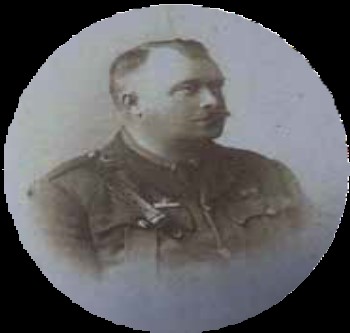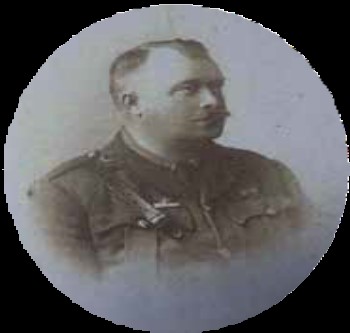The Man Behind the Medal

THE MAN BEHIND THE MEDAL: LIEUTENANT-COLONEL WA BAWDEN, TD, DUKE OF CORNWALL'S LIGHT INFANTRY, COMMANDING OFFICER ON THE SOMME 1915-16, THRICE MAYOR OF BODMIN AND A PIVOTAL PERSONALITY IN THE HISTORY OF THE COUNTRY TOWN
William Arthur Bawden was born in 1867 at Truro, Cornwall, the second son of William Bawden and Amelia Moyle of Chacewater, Kenwyn. The family were of means, having lineage with interests in min- ing and fishing, and William senior is described as a Gentleman upon records of the period. Ed- ucated at Truro College, Bawden soon thereafter took employment as a cashier with the Devon & Cornwall Bank and was posted to their branch at Redruth. Having excelled, he was promoted to Manager and transferred to the branch in Bodmin in 1893. Taken over by Lloyds Bank in 1908, Bawden continued to manage the Bod- min branch and was instrumental in its move to rather grander premises in the High Street. As an important County Town, Bodmin was flour- ishing at the turn of the Century, the bank con- ducting business with the agricultural industry, the Assizes, the Headquarters and Depot of the DCLI (always 7,000 to 8,000 men in barracks), the Lunatic Asylum with 1,000 inmates, and the County Jail.

Bawden entered every phase of life in the town. He served as Mayor in 1899, 1904 and 1910, and acted as Alderman for over 12 years. He also served as a JP and Captain of the town fire brigade for over 26 years. Instrumental in creating the Royal Cornwall Golf Club, he acted as Treasurer for 3 years and gave his name to the ‘Bawden Cup’ - a strokeplay tournament which necessitated a fine short game on the exposed and craggy moorland course. In 1911 he was invited to London for the Coronation of King George V at Westminster. By family repute, he only just made it in time after ignoring repeated letters and his secretary being away on maternity leave. According to his son, Frank Bawden, his father was always available for a personal meeting but ‘he disliked the telephone and would not have one in his private office.’
At the outbreak of the Great War, Bawden was placed in Command of the 1/5th Battalion, Duke of Cornwall Light Infantry at Bodmin - following almost 20 years of service with the 2nd VB, DCLI. He spent much of 1914 and early 1915 training his men at Bodmin, Salisbury Plain and Falmouth, before being posted to France and replacing Lieutenant-Colonel Norman Gray on 4th June 1915 after he had been invalided. Serving with his men on the Somme, the 1/5th, as a Territorial unit, were heavily engaged in maintaining trenches and assisting the Royal Engineers in consolidating ground. According once again to his son, “father was particularly proud that he took with him to France 1026 Cornishmen, including his own son and two of his brothers’ sons from the Plymouth branch. All served as 2nd Lieutenants, and all came home safely.” He was also particularly proud of the ‘mention’ afforded the Battalion at the end of the War, on account of fine services rendered, a rare distinction and one of only 12 awarded during the conflict.
Having originally married a German woman, Amalie Henrietta Dietzsch, at Truro in 1893, Bawden’s second wife, Ethel Mary Ewens, whom he married in 1895, proved an important personality during the war years. As men from the Battalion were killed or injured, she put it upon herself to travel the County, offering sympathy and practical help - includingsmallprivate funds – to the bereaved widows and mothers. At a time when her own health was deteriorating, she - like her how successful smuggling had proved centuries beforehand in the isolated Cornish coves and inlets. Bawden took retirement from the Bank in 1932. At this time it was more popularly known as ‘Bawden’s Bank’ and there was much civil fanfare in the town at his leaving. However, with the outbreak of the Second World War the ‘Dark Horse’ returned and once again managed the Bodmin branch from 1939-40 until a replacement could be found. He subsequently worked on his son’s 180 acre farm on the moor for the last few months of his life, passing away on 21st November 1942. William Bawden is buried alongside his second wife, Ethel Mary, in the New Cemetery, Bodmin. His son, Frank Bawden, also Commanded the 1/5th Battalion, DCLI,and went on to serve on the Staff of Lord Allenby during husband - believed in the importance of offering condolences face to face, rather than through a letter, despite the relative isolation of many of the Lieutenant-Colonel Bawden, TD, 1914-15 the Second World War. Following a very similar path to his father, Frank also twice served as Mayor in cottages and farmsteads upon Bodmin Moor and the notoriously inclement weather.
On 11th December 1916, Bawden was replaced by Lieutenant-Colonel Trevor Carus- Wilson as a result of deteriorating health and increasing infirmity. He returned home to Bodmin and was among the first to hear about the death of his friend in March 1918 from wounds received in action on the Western Front. Returning to work for the bank, he dedicated his time to raising funds to help local people bereaved or maimed by the war, and contributed to the process of recruitment in the County. As the U-Boat menace increased around Cornish waters, he also assisted with maintaining permanent guard along what is today known as the South-West Coastal Path, knowing full well how successful smuggling had proved centuries beforehand in the isolated Cornish coves and inlets. Bawden took retirement from the Bank in 1932. At this time it was more popularly known as ‘Bawden’s Bank’ and there was much civil fanfare in the town at his leaving. However, with the outbreak of the Second World War the ‘Dark Horse’ returned and once again managed the Bodmin branch from 1939-40 until a replacement could be found. He subsequently worked on his son’s 180 acre farm on the moor for the last few months of his life, passing away on 21st November 1942. William Bawden is buried alongside his second wife, Ethel Mary, in the New Cemetery, Bodmin.
His son, Frank Bawden, also Commanded the 1/5th Battalion, DCLI,and went on to serve on the Staff of Lord Allenby during the Second World War. Following a very similar path to his father, Frank also twice served as Mayor in the 1930s, before relocating in the late 1940s to Aberystwyth, Wales. Suffering from health problems associated with adampclimate,he took his doctor’s advice and emigrated to California in the 1960s, where he later died. In a closing letter written to the manager of his branch of Lloyds Bank in Wales in 1978, which requested the closure of the account and transfer of funds to Santa Barbara, Frank wrote: “I know that there are many more families who have given more service to the Bank than the Bawdens, but I do feel that this account (opened in 1915), shows a certain amount of intimacy between the Bank, the Services and the townspeople that is not possible now, chiefly because there is no time. Today’s rush and the computer world is not all for the best I fear.”



